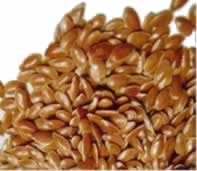Flaxseed Benefits for Breast Cancer
In a study published in Journal of In Vitro Cellular & Developmental Biology – Animal, 2012 entitled “Flaxseed sprouts induce apoptosis and inhibit growth in MCF-7 and MDA-MB-231 human breast cancer cells” reported that Flaxseeds have shown to play a role in the prevention of cancer suggesting that flaxseed sprouts induce apoptosis and inhibit cancer cell growth, thereby demonstrating their anti-proliferative effects in breast cancer cells. This study may provide important information for devising dietary strategies to reduce breast cancer risk.
http://www.ncbi.nlm.nih.gov/pubmed/22438134
Flaxseed Benefits for Colon Cancer
In another study published in Asian Pacific Organization for Cancer Prevention Journal, 2011 entitled “Cancer chemopreventive potential of the egyptian flaxseed oil in a rat colon carcinogenesis bioassay - implications for its mechanism of action” the possible chemopreventive effects of natural Egyptian flaxseed oil on preneoplasia and cancer formation were investigated in a rat medium-term colon carcinogenesis bioassay and it was found out that the post initiation dietary administration of flaxseeds oil suppressed DMH-induced colon carcinogenesis in rats without significant side effects. The mechanism is likely to be through its inhibitory effects on early cellular proliferation and modulation of mucin secretion properties in the initiated colonic mucosa
http://www.ncbi.nlm.nih.gov/pubmed/22296388
Flaxseed Antioxidant Protective Activity Benefits the Kidneys from Drug Hepatotoxicity
In a study published in the Journal of Human & Experimental Toxicology. 2012 entitled “Studies on the protective effect of flaxseed oil on cisplatin-induced hepatotoxicity” have shown that among the numerous health benefits of flaxseed oil is its ability to protect the kidneys from the tissue-specific toxicity from Ciplatin – a potent chemotherapeutic anti tumor drug. . The results show that dietary supplementation of flaxseed oil in Cisplatin-treated rats ameliorated Cisplatin-induced hepatotoxic and other deleterious effects due to its intrinsic biochemical/antioxidant properties.
http://www.ncbi.nlm.nih.gov/pubmed/22249395
Health Benefits of Flaxseed Diet for Diabetes Mellitus Patients
In a study published in the Journal of Dietary Supplements entitled “An Open-Label Study on the Effect of Flax Seed Powder (Linum usitatissimum) Supplementation in the Management of Diabetes Mellitus” have reported that flax seed is a functional food that is rich in omega 3 fatty acids and antioxidants and is low in carbohydrates. A group of patients with diabetes mellitus were given a flaxseed rich diet and were compared to a control group who are on a regular diet. Results have shown a favorable reduction in total cholesterol (14.3%), triglycerides (17.5%), low-density lipoprotein cholesterol (21.8%), and apolipoprotein B and an increase in high-density lipoprotein cholesterol (11.9%) were also noticed to those who were fed with flaxseed rich diet. These observations suggest the therapeutic potential and health benefits of flaxseed in the management of diabetes mellitus with no side effects.
http://www.ncbi.nlm.nih.gov/pubmed/22432725
Anti-inflammatory, analgesic and antipyretic Action of Flaxseed Oil
A study published in the Indian Journal of Experimental Biology. 2011 entitled “Anti inflammatory, analgesic and antipyretic activities of Linum usitatissimum L. (flaxseed/linseed) fixed oil” have shown that the fixed oil of L. usitatissimum (flaxseed/linseed) inhibited PGE2-, leukotriene-, histamine- and bradykinin-induced inflammation. Flaxseed oil also inhibited arachidonic acid-induced inflammation, suggesting its capacity to inhibit both cyclooxygenase and lipoxygenase pathways of arachidonate metabolism. This flaxseed oil benefits dual inhibition of arachidonic acid metabolism, antihistaminic and antibradykinin activities of the oil could account for the biological activity and the active principle could be alpha-linolenic acid an omega-3 (18:3, n-3) fatty acid.
http://www.ncbi.nlm.nih.gov/pubmed/22403867
Health Benefits of Flaxseed for Digestive System and Constipation
In a study published in BMC Complementary and Alternative Medicine. 2012 entitled “Laxative effects of partially defatted flaxseed meal on normal and experimental constipated mice” have investigated the traditional health benefit derived from flaxseed as a dietary fiber supplement in the prevention and treatment of constipation. The study have shown that M- and H-PDFM significantly increase small intestinal transit rates in constipation model mice. All dose of PDFM markedly shortened the start time of defecation and M- and H-PDFM significantly increase stool frequency and weight in both normal and constipation model mice. The study further suggested that dietary supplementation of flaxseed may benefit the digestive function facilitating the fecal output in normal and constipation conditions.
http://www.ncbi.nlm.nih.gov/pubmed/22400899
Flaxseed Protects Against Nuerologic Toxic Effects of Lead
In a study published in the Biological Trace Element Research. 2012 entitled “Flaxseed Oil as a Neuroprotective Agent on Lead Acetate-Induced Monoamineric Alterations and Neurotoxicity in Rats” have investigated the nueroprotective effect of flaxseed oil against lead exposure that causes a number of adverse side effects in both man and animals.
The study used rats injected with lead in different parts of the brain and were treated with flaxseed oil exhibited a marked improvement in most of the studied parameters as well as the immunohistochemistry features. These data indicated that dietary flaxseed oil provide protection against lead-induced oxidative stress and neurotoxic effects.
http://www.ncbi.nlm.nih.gov/pubmed/22395955
Flaxseed Diet can Lower Blood Cholesterol Level
Flaxseeds are a good source of dietary fibers, and a large proportion of these are water-soluble viscous fibers. It has been proposed that dietary fibers play a role in cardiovascular risk as well as body weight management. In a study published in Nutrition & Metabolism 2012 entitled “Flaxseed dietary fibers lower cholesterol and increase fecal fat excretion, but magnitude of effect depend on food type” the effect of flaxseed dietary fibers in different food matrices on blood lipids and fecal excretion of fat and energy in a double-blind randomized crossover study with 17 subjects were examined. Test results indicated that subjects fed with flaxseed drink and flaxseed bread resulted in decreased plasma total and LDL-cholesterol and increased fat excretion. The study further suggests that health benefits from viscous flaxseed dietary fibers may include lowered blood cholesterol and potentially play a role in energy balance.
http://www.ncbi.nlm.nih.gov/pubmed/22305169
Anti-inflammatory and Antiapoptosis Activity of Flaxseed.
Dietary flaxseed is a rich source of naturally occurring antioxidants and has been shown to reduce lung ischemia reperfusion injury in mice. This was the result of a study published in Journal of Surgical Research 2011 entitled “Dietary flaxseed protects against lung ischemia reperfusion injury via inhibition of apoptosis and inflammation in a murine model”. The study further suggests that dietary flaxseed is protective against lung ischemia reperfusion injury in a clinically relevant murine model, and this protective effect may in part be mediated by the inhibition of apoptosis and inflammation
http://www.ncbi.nlm.nih.gov/pubmed/21872269
Flaxseed Supplement Effective in Mitigating Radiation Treatment Effects
In a study published in BMC Cancer. 2011 entitled “Dietary flaxseed administered post thoracic radiation treatment improves survival and mitigates radiation-induced pneumonopathy in mice” the antioxidant and anti-inflammatory health benefits of flaxseed were examined if there is a potential protective effect on lung tissues that were exposed to radiation treatment. Flaxseed supplement were administered to radiation exposed rats and its effect is examined. It was determined that dietary flaxseed supplement given post-XRT mitigates radiation effects by decreasing pulmonary fibrosis, inflammation, cytokine secretion and lung damage while enhancing mouse survival. The study further suggests that dietary flaxseed supplement may be a useful adjuvant treatment mitigating adverse effects of radiation in individuals exposed to inhaled radioisotopes or incidental radiation
http://www.ncbi.nlm.nih.gov/pubmed/21702963
Health Benefits of Flaxseed Supplements in Cardiovascular Disease
A study was done in the Institute of Cardiovascular Sciences, University of Manitoba, Winnipeg, Canada that was published in the Journal of Applied Physiology, Nutrition and Metabolism. 2009 entitled “Experimental and clinical research findings on the cardiovascular benefits of consuming flaxseed”, reported that the study intends to examine the health benefits and (or) reducing the risk of flaxseed supplements against chronic diseases. Multiple clinical dietary intervention trials report that consuming flaxseed daily can provide health benefits that include reduced circulating total cholesterol (TC) by 6%-11% and low-density lipoprotein (LDL) cholesterol by 9%-18% in normolipemic humans and by 5%-17% for TC and 4%-10% for LDL cholesterol in hypercholesterolemic patients, as well as lower various markers associated with atherosclerotic cardiovascular disease in humans. Evidence to date suggests that the dietary fibre and (or) lignan content of flaxseed provides the hypocholesterolemic action. The omega-3 ALA found in the flaxseed oil fraction also contributes to the antiatherogenic effects of flaxseed via anti-inflammatory and antiproliferative mechanisms. Dietary flaxseed may also protect against ischemic heart disease by improving vascular relaxation responses and by inhibiting the incidence of ventricular fibrillation.
http://www.ncbi.nlm.nih.gov/pubmed/19935863
Antioxidant and angiotensin converting enzyme-inhibitory properties of a flaxseed protein-derived high Fischer ratio peptide mixture
In a report published int the Journal of Agriculture and Food Chemistry 2010, showed that the hydrolysis of flaxseed proteins using thermolysin and pronase followed by mixing with activated carbon, centrifugation and filtration yielded a filtrate (peptide mixture) with a Fischer ratio (branched-chain amino acids/aromatic amino acids) of 23.65 and a phenylalanine + tyrosine content of 1.11%. Gel permeation chromatography showed that the flaxseed peptide sample contained mainly low molecular weight peptides (<4 kDa), this multifunctional flaxseed peptide mixture could be used to formulate food products with multiple human health benefits during liver diseases, oxidative stress and hypertension.
http://www.ncbi.nlm.nih.gov/pubmed/20218606

 Scientific Name: Linum usitatissimum
Scientific Name: Linum usitatissimum The flax is an erect annual plant growing to about 1.2 meter in height with the slender, lanceolate leaves about 30 cm in length and 3 mm wide. Common flax plant has slender, fibrous long stems while the blue flowers have five petals about 20 mm in diameter. Flax bears fruits that are about 7 mm in diameter containing several glossy brown (golden) seeds about 6 mm long.
The flax is an erect annual plant growing to about 1.2 meter in height with the slender, lanceolate leaves about 30 cm in length and 3 mm wide. Common flax plant has slender, fibrous long stems while the blue flowers have five petals about 20 mm in diameter. Flax bears fruits that are about 7 mm in diameter containing several glossy brown (golden) seeds about 6 mm long. 

